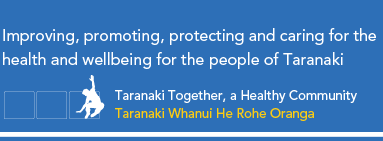Think about the ones you love and have a smear says National Screening Unit
3 September 2014
Taranaki women are being asked to consider the impact their health has on family and friends this September, by ensuring that their smears are up to date as part of Cervical Screening Awareness Month.
The focus of September’s Cervical Screening Awareness Month is to inspire women to think about the wider effect their health has on those they love – and how it is worth putting their health first for the ones they love.
“A cervical smear test usually takes less than 15 minutes and should be done every three years. It is a simple procedure that has the proven ability to save lives,” commented Robyn Maxwell, Taranaki DHB Registers Coordinator, Regional Screening Unit.
Cervical cancer is one of the most preventable forms of cancers and results show that screening every three years can reduce the risk of developing it by up to 90 per cent.
The cervical smear test is a screening test to find abnormal changes in the cells of the cervix. These cell changes are caused by the human papillomavirus (HPV) virus. HPV infection is very common, and most people come into contact with it at some stage of their life.
To support Cervical Screening Awareness Month, activities in Taranaki include Women’s Days at venues throughout the region and a local media campaign with Te Korimako radio station.
With cervical screening rates for Maori, Pacific and Asian women around 10 to 20 per cent lower than other groups, Ms Maxwell says these women are a particular priority.
Ms. Maxwell says the changes in the cervix from HPV infection happen very slowly. By
having regular smears there is an excellent chance that the abnormal cells will be found
and treated long before they ever become cancer.
“A cervical smear test saves lives because it’s all about finding changes early. The sooner we can pick up any abnormal cells, the sooner a woman can be treated”, she says.
The goal of the National Cervical Screening Programme is to reduce the number of women in New Zealand who develop cervical cancer.
Regular cervical smear tests are the best prevention, and screening every three years is recommended for women aged 20 to 70 years who have ever been sexually active.
“It’s easy to find out when your next smear is due. Either call your GP or free-phone 0800 729 729” said Loga Crichton, Team Leader at West Fono Health Trust (The Fono), and Cervical Screening Awareness Month spokesperson.
For more information visit www.cervicalscreening.govt.nz
ENDS
For further information, please contact:
Robyn Maxwell, Registers Coordinator, Regional Screening Unit, cervicalscreening@tdhb.org.nz or
Cressida Gates, Taranaki DHB Media Advisor, 027 703 6177
About Cervical Screening Awareness Month
Cervical Screening Awareness Month provides a prompt for women throughout New Zealand to have a smear if it is due or overdue. The event is an important part of the Ministry of Health’s aim of promoting early detection of abnormalities.
The main National Cervical Screening Programme was established in 1990. While coverage rates have increased over time, priority groups continue to be Maori and Pacific women aged 30–50 years, especially, who have ever been sexually active and who have not had a cervical smear test within the last three years.
Currently, 1.5 million women are enrolled in the programme.
To find out more about cervical screening visit www.cervicalscreening.govt.nz
Last updated: Wednesday, September 3, 2014


